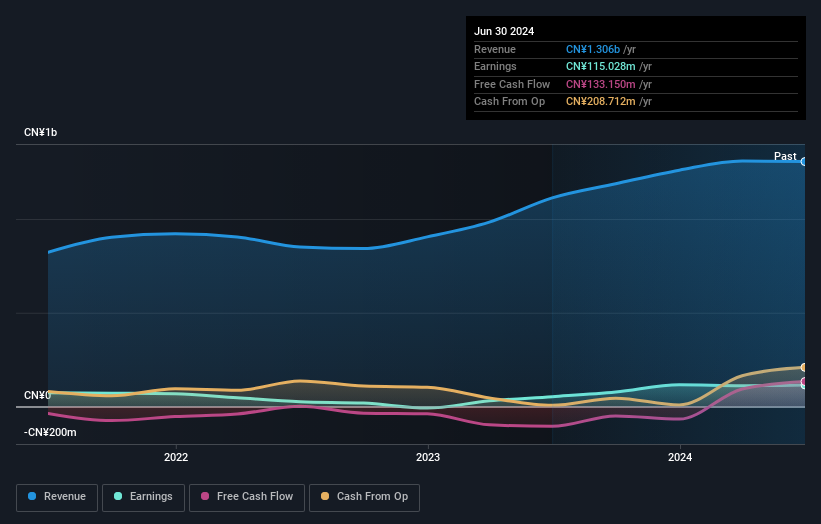- China
- /
- Auto Components
- /
- SHSE:603121
As Shanghai Sinotec (SHSE:603121) pops 13% this past week, investors may now be noticing the company's five-year earnings growth

This week we saw the Shanghai Sinotec Co., Ltd. (SHSE:603121) share price climb by 13%. But that doesn't change the fact that the returns over the last five years have been less than pleasing. In fact, the share price is down 51%, which falls well short of the return you could get by buying an index fund.
While the stock has risen 13% in the past week but long term shareholders are still in the red, let's see what the fundamentals can tell us.
View our latest analysis for Shanghai Sinotec
In his essay The Superinvestors of Graham-and-Doddsville Warren Buffett described how share prices do not always rationally reflect the value of a business. One imperfect but simple way to consider how the market perception of a company has shifted is to compare the change in the earnings per share (EPS) with the share price movement.
During the unfortunate half decade during which the share price slipped, Shanghai Sinotec actually saw its earnings per share (EPS) improve by 2.0% per year. So it doesn't seem like EPS is a great guide to understanding how the market is valuing the stock. Or possibly, the market was previously very optimistic, so the stock has disappointed, despite improving EPS.
Based on these numbers, we'd venture that the market may have been over-optimistic about forecast growth, half a decade ago. Looking to other metrics might better explain the share price change.
Revenue is actually up 17% over the time period. A more detailed examination of the revenue and earnings may or may not explain why the share price languishes; there could be an opportunity.
The company's revenue and earnings (over time) are depicted in the image below (click to see the exact numbers).

Balance sheet strength is crucial. It might be well worthwhile taking a look at our free report on how its financial position has changed over time.
What About The Total Shareholder Return (TSR)?
Investors should note that there's a difference between Shanghai Sinotec's total shareholder return (TSR) and its share price change, which we've covered above. Arguably the TSR is a more complete return calculation because it accounts for the value of dividends (as if they were reinvested), along with the hypothetical value of any discounted capital that have been offered to shareholders. Dividends have been really beneficial for Shanghai Sinotec shareholders, and that cash payout explains why its total shareholder loss of 48%, over the last 5 years, isn't as bad as the share price return.
A Different Perspective
While it's never nice to take a loss, Shanghai Sinotec shareholders can take comfort that their trailing twelve month loss of 4.5% wasn't as bad as the market loss of around 14%. What is more upsetting is the 8% per annum loss investors have suffered over the last half decade. This sort of share price action isn't particularly encouraging, but at least the losses are slowing. I find it very interesting to look at share price over the long term as a proxy for business performance. But to truly gain insight, we need to consider other information, too. To that end, you should be aware of the 1 warning sign we've spotted with Shanghai Sinotec .
For those who like to find winning investments this free list of undervalued companies with recent insider purchasing, could be just the ticket.
Please note, the market returns quoted in this article reflect the market weighted average returns of stocks that currently trade on Chinese exchanges.
New: Manage All Your Stock Portfolios in One Place
We've created the ultimate portfolio companion for stock investors, and it's free.
• Connect an unlimited number of Portfolios and see your total in one currency
• Be alerted to new Warning Signs or Risks via email or mobile
• Track the Fair Value of your stocks
Have feedback on this article? Concerned about the content? Get in touch with us directly. Alternatively, email editorial-team (at) simplywallst.com.
This article by Simply Wall St is general in nature. We provide commentary based on historical data and analyst forecasts only using an unbiased methodology and our articles are not intended to be financial advice. It does not constitute a recommendation to buy or sell any stock, and does not take account of your objectives, or your financial situation. We aim to bring you long-term focused analysis driven by fundamental data. Note that our analysis may not factor in the latest price-sensitive company announcements or qualitative material. Simply Wall St has no position in any stocks mentioned.
About SHSE:603121
Excellent balance sheet with proven track record.


